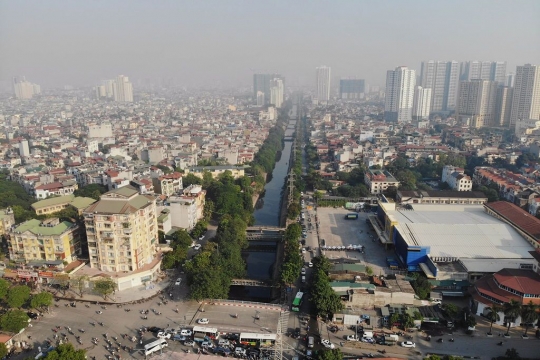Biodiversity and healthy ecosystems provide essential resources and services that support human wellbeing. Undervaluing these ‘free’ offerings from the environment, though, has led to them being overexploited and polluted. A global movement is developing, which seeks to use an accounting framework to highlight the value of the environment’s contribution towards the economy. EfD is contributing to this growing area through its Ecosystem Services Accounting for Development (ESAforD) project, a seven-country ecosystem service valuation project which aims to look beyond gross domestic product as a measure of economic performance.
What are the challenges?
Biodiversity and healthy ecosystems provide essential services that humans depend upon in their daily lives, such as clean water, productive soils, and flood control, to name just a few. But these contributions, or services, are often taken for granted, resulting in overexploitation, habitat destruction, and pollution. The resulting damage to livelihoods has profound consequences for economic development and is one of the reasons that environmental concerns now stand at the core of the global development agenda.
The traditional systems of national accounts measure economic growth such as gross domestic product (GDP), but fail to capture the critical connections between the environment and the economy, or the contribution of natural resources like forests, water, and fisheries to economic output. This is a major knowledge gap, presenting significant obstacles to effective policy development.
In response, a global movement has emerged which aims to connect economic and environmental information for improved policy choices, including employing an accounting framework to explicitly measure the environment’s contribution to the economy. Official environmental-economic accounts, also known as natural capital accounts, are now being implemented by over 80 national governments across the globe.
The international standard governing the development of these accounts, one that is consistent with traditional measures like GDP, is the System of Environmental Economic Accounts (SEEA). This is produced and released under the auspices of the United Nations, the European Commission, the Food and Agriculture Organisation of the United Nations, the Organisation for Economic Co-operation and Development, the International Monetary Fund, and the World Bank Group.
An exciting area of emerging research within this effort moves beyond looking just at material resources like timber, to include the harder-to-measure ecosystem services offered by forests, for instance, that are rarely traded in the marketplace. For example, forests store carbon and reduce erosion.
Ecosystem accounts are currently classified as 'experimental', but their guidelines are receiving a major revision with the goal of mainstreaming the practice of ecosystem accounting by 2020.
EfD is addressing the problem
To assist this effort, the Environment for Development (EfD) Initiative launched the Ecosystem Services Accounting for Development (ESAforD) project, an unprecedented seven-country ecosystem service valuation project involving EfD centers in Costa Rica, China, Ethiopia, Kenya, Tanzania, South Africa, and Sweden. The Swedish Environmental Protection Agency (SEPA) and the World Bank’s WAVES global partnership are project partners, and are providing valuable capacity and expertise in linking the project results to policy impact.
By looking at the same ecosystem services across multiple countries, the project is seeking to develop methodologies in line with national accounting principles. The need is great. Valuing ecosystem services is extremely challenging, and for many types of services there is a dearth of good available case studies.
'It’s exciting. I think this will go on for several years, even decades,' says Juha Siikamaki, chief economist for the International Union for the Conservation of Nature and research leader of ESAforD, 'and we’ll see more and more of not the economy working against nature but the economy and people working with nature for everyone’s benefit.'
Meanwhile, Alessandra Alferi, the head of the Environmental Accounts Section of the United Nations Statistical Division, says that this project is important because it contributes to a more agreed-upon methodology for valuing ecosystem services. Alfred adds that the results 'will feed into the revision' of the SEEA.
In each of the participating countries, EfD researchers are examining three specific ecosystem services: water filtration, pollination, and urban green spaces. Although still underway, the project has already produced important policy findings of immediate relevance to policymakers.
- Preliminary results from Costa Rica show that the presence of healthy upstream forests results in clean water, reduced use of chemicals at water treatment plants, and lower purification costs.
- Tanzanian households, who are heavily dependent on small-holder and often subsistence farming for their livelihoods, benefit from the free ecosystem services offered by wild pollinators, which boost agricultural yields. Some evidence suggests that female-headed households in particular benefit from being in proximity to ecosystems that are rich with pollinators.
- In Beijing, China, the city’s green spaces and parks are estimated to be worth the equivalent of the mega-city’s annual GDP, a figure that provides important insight for those charged with making complex land-use decisions in one of the world’s most dynamic cities.
Results like these, along with those expected from other countries, directly inform strategies to reach the targets outlined in the 2030 Agenda for Sustainable Development. The cross-cutting nature of the work means that the results not only inform specific environmental goals such as clean water and forest protection, but the full range of Sustainable Development Goals (SDGs), including those related to economic and social development in both rural and urban areas. The SEEA itself is a key monitoring framework for the SDG process and currently can be used to develop over 40 indicators.
The EfD researchers working on the ESAforD project are at the forefront of the paradigm shift that Siikamaki identifies, using the unique mix of academic expertise, policy focus, and global connections that are EfD’s hallmark.
'It would be impossible to make this kind of contribution without having all these EfD centers involved,’ says Per Stromberg, an economist with SEPA who is involved in the project, 'because they really have the research capacity on the ground.’
Which SDGs does this work tackle?
15 Life on land
3 Good health and well-being
6 Clean water and sanitation
Further information:
http://www.efdinitiative.org/news/archive/calculating-value-pollination-tanzanian-farmers
http://www.efdinitiative.org/news/archive/standardising-valuation-natures-services
http://www.efdinitiative.org/news/archive/putting-price-tag-natural-water-purification
Audiovisual material:
ESAforD presents: Water: https://www.youtube.com/watch?v=sgLCTpjJHHg
ESAforD presents: Urban Green Spaces: https://www.youtube.com/watch?v=su8TOdYHHDA
ESAforD presents: Pollination: https://www.youtube.com/watch?v=82mW6Jnhm3s

